Philadelphia’s Food Service History is Black History
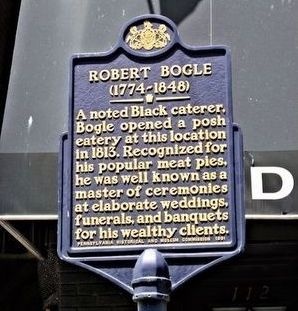
From the Historical Marker Database, photographed by Carolyn Martienssen, June 2015
You might have noticed on South 8th Street a historical marker that reads: “A noted Black caterer, [Robert] Bogle opened a posh eatery at this location in 1813. Recognized for his popular meat pies, he was well known as a master of ceremonies at elaborate weddings, funerals, and banquets for his wealthy clients.” This sign marks not only the location of his food establishment, but the birthplace of the catering industry as we know it today.
Prior to Bogle, catering (as it came to be called only in the 1860s) was organized and executed by private cooks and servants to the wealthy. But there also existed the public butler or waiter—usually a free person of color employed by several households. Sidestepping competition with Irish-Americans in other hospitality service sectors, Bogle appropriated this role of the public butler to corner the market for food service at large social gatherings. When he added his culinary talent, social capital, and entrepreneurial skills, Bogle could only stand to revolutionize the way Philadelphia hosted weddings, banquets, christenings, and funerals.
Though initially known for his terrapin preparations and his funeral direction, Bogle became a leader of the African American community and was praised for his social fluidity and business acumen. He accessed influence too through his establishment, the Blue Bell Tavern, which became the regular meeting place for politicians and Philadelphia’s social elite. A prominent white Philadelphia banker, Robert Biddle, even commemorates how Bogle’s
…reign
Extends o’er nature’s wide domain
Begins before our earliest breath,
Nor ceases with the hour of death…
…
Before his stride the town gives way—
Beggars and belles confess his sway;
Drays, prudes, and sweeps, a startled mass,
Rein up to let his cortege pass;
And Death himself, that ceaseless dun
Who waits on all, yet waits for none,
How hears a greater waiter’s tone,
And scarcely deems his life his own.
…
The smile as bright, as soft the ogle,
But never—never such a Bogle!””
(excerpts from “An Ode to Bogle” by Nicholas Biddle [1837?])
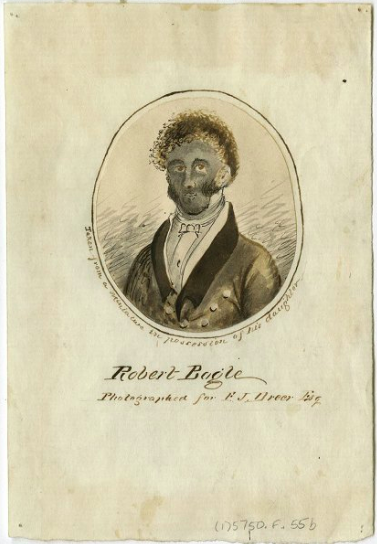
Image from the Library Company of Philadelphia.
Bogle’s new industry gave the African American community entry into higher social and economic echelons as chefs, servers, and entrepreneurs, and paved an avenue for the empire of Black-owned-and-operated catering companies that succeeded his. French West Indian immigrants displaced by the Haitian Revolution came to Philadelphia and made a notable impact on the nascent industry, contributing their training in French culinary arts and service and establishing their own businesses. These companies dominated the sphere by sharing resources and facilities to serve a mostly white, elite clientele with sophisticated and diverse menus—a collaborative organism that would orchestrate Philadelphia events for over a century.
Bogle is credited not only with the birth of an entire industry, but the creation of the Guild of Caterers and training some of the heads of subsequent great Black catering companies: the Prossers, Thomas Dorsey (Jones, Dorsey, and Minton), Jeffery Chew, St. John Appo, and Peter Augustin(e), who inherited Bogle’s throne as Philadelphia’s catering king . Augustine’s venture and high-society restaurant made Philadelphia catering famous nationwide and his kin intermarried other Haitian catering families to make a true dynasty that ended in the 1960s with the Dutrieulle family.
As W.E.B. DuBois notes, the collapse of Black catering empires was due to the shift in clientele from elites to the middle class (causing a drop in prices and decadence in personal relationships with caterers) as well as competition from small, white-led catering companies (84). This should not shade, however, the hand that Black caterers had in changing the way we celebrate with food and the legacy of their forefather, “stern, multiferious” Robert Bogle.
Sources: (available at the Free Library)
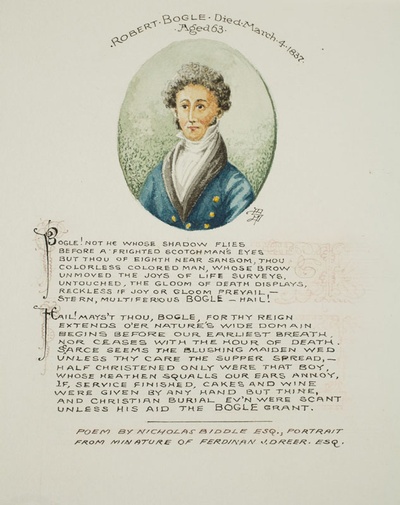
Biddle, Nicholas. An Ode to Bogle. (Philadelphia, Priv. print. for F.J. Dreer, 1865)
AF811 B47

DuBois, W. E. B. “The Guild of the Caterers, 1840–1870” in The Philadelphia Negro: A Social Study (New York: Oxford UP, 2016). 18-23.
974.811 D8525P3

Harris, Jessica B. “City Food, South and North” in High on the Hog. 118-121
641.5929 H242H
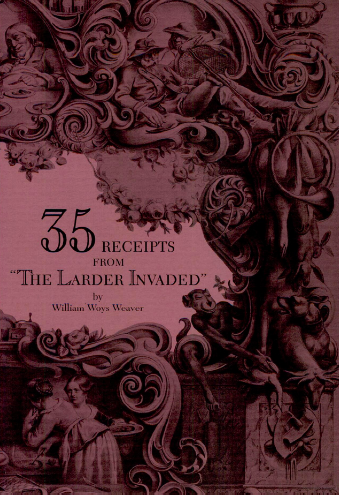
Weaver, William Woys. 35 Receipts from “The Larder Invaded” (Philadelphia: LCP, 1986).
016.6415 W379T
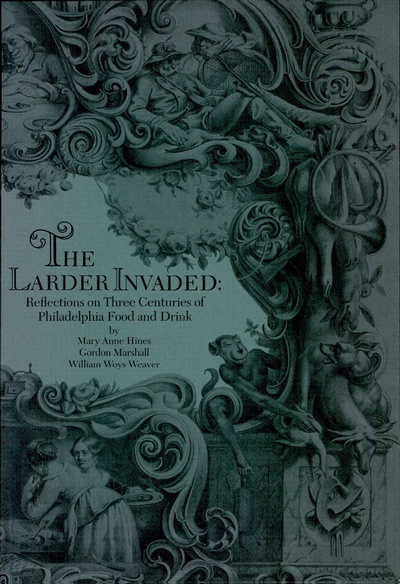
Hines, Mary Anne, Gordon Marshall, and William Woys Weaver. The Larder Invaded: Reflections on Three Centuries of Philadelphia Food and Drink. (Philadelphia: LCP, 1987)
641.013 H589L
Have a question for Free Library staff? Please submit it to our Ask a Librarian page and receive a response within two business days.

![Akin, James, Philadelphia taste displayed. Or, bon-ton below stairs. [circa 1830], lithograph, hand-colored; 29 x 41 cm.(19.5 x 14.5 in.), Library Company of Philadelphia](https://libwww.freelibrary.org/images/blog/FLPBlog/resized/bogle-bon-ton.jpg)